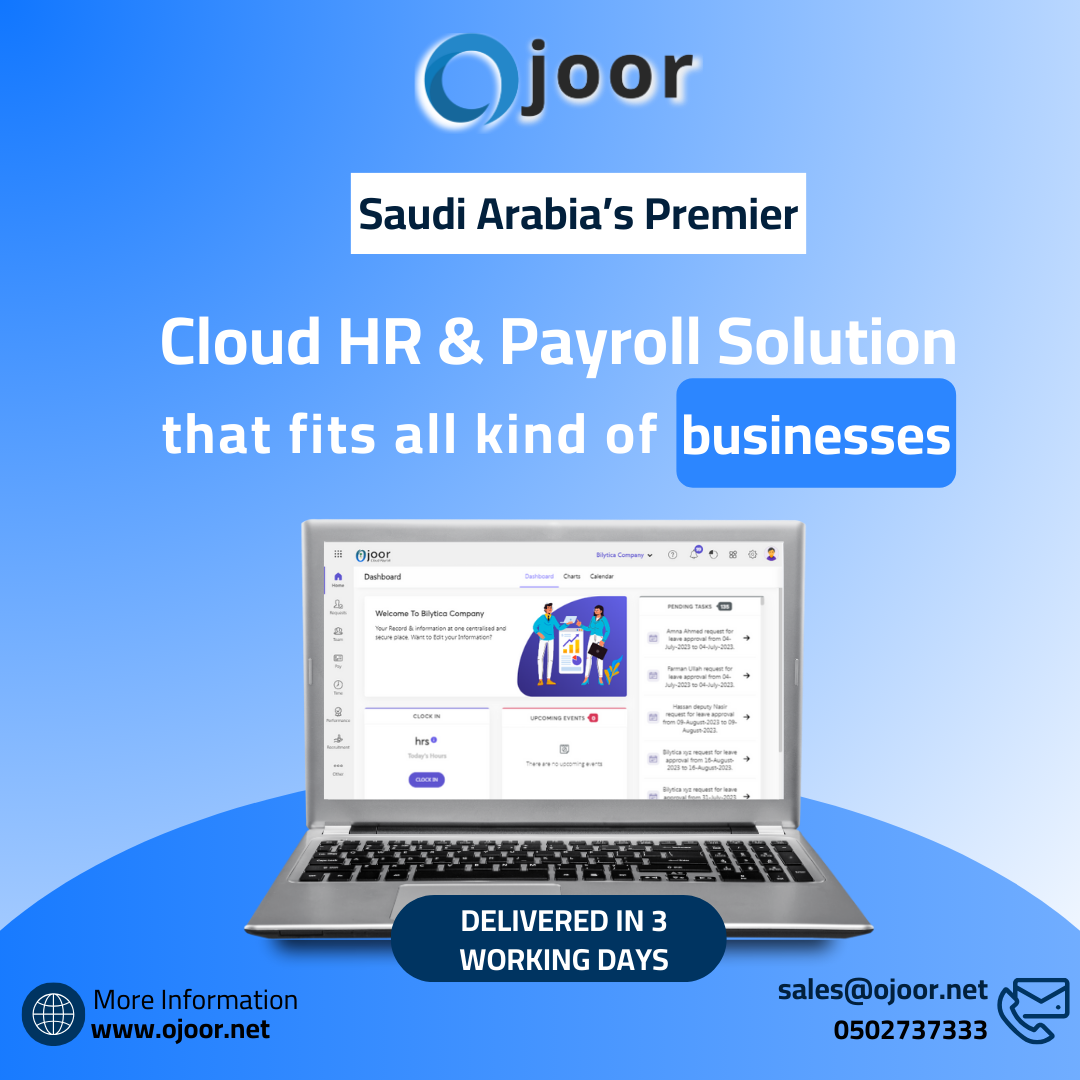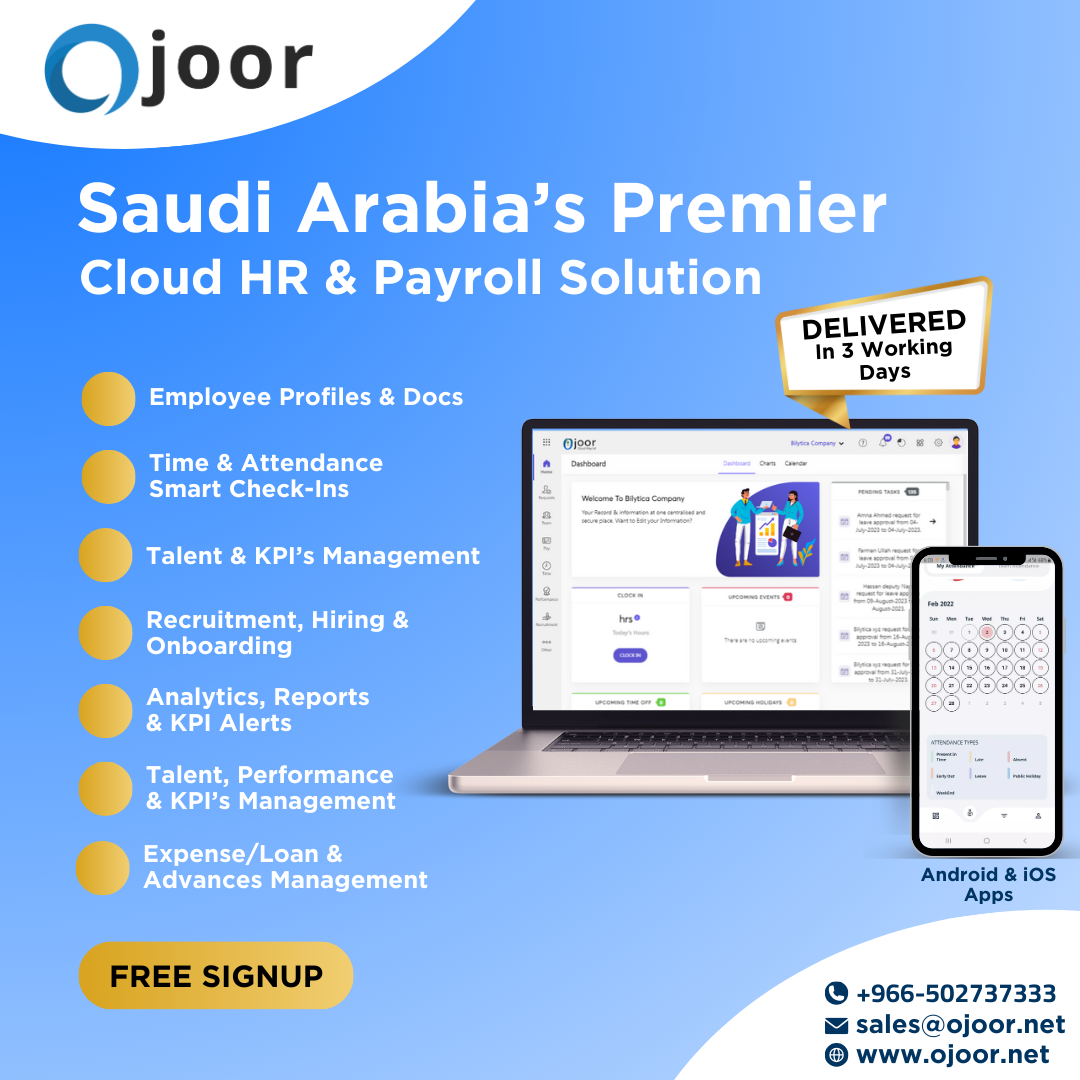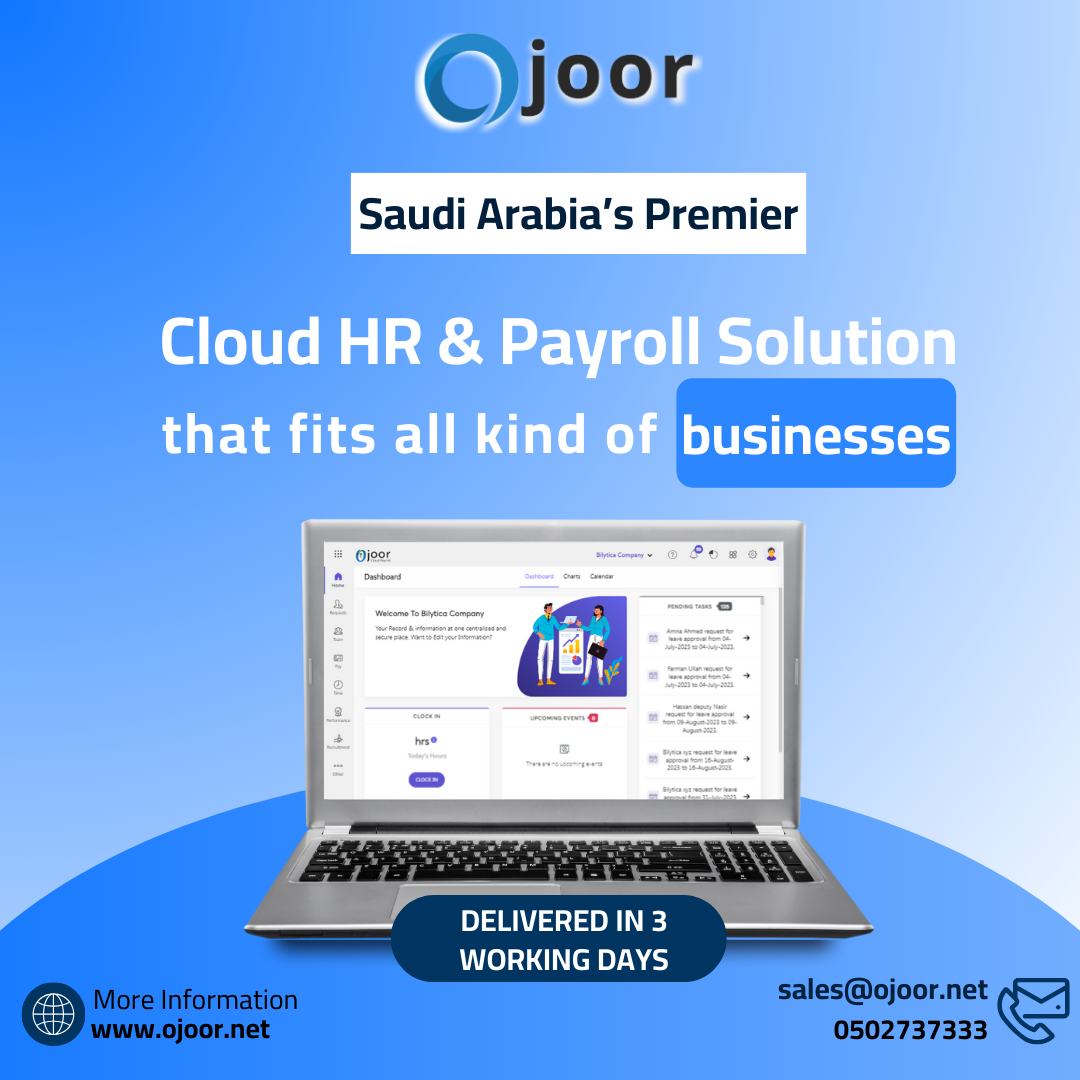Ojoor # 1 is one of the top HRIS Systems that serve as the backbone of HR operations, providing organizations with centralized platforms to manage employee data, streamline processes, and drive strategic decision-making. In today’s interconnected business landscape, the ability of HRIS systems to integrate with other business software and systems has become increasingly important. This article explores the benefits and challenges of HRIS system integration, as well as the key considerations for organizations seeking to maximize the value of their HR technology investments.
Click to Start Whatsapp Chatbot with Sales
Mobile: +966547315697
Email: sales@Ojoor.net
Ojoor #1 HRIS Systems

Can an HRIS Systems integrate with other business software?
Seamless Data Exchange
One of the primary advantages of HRIS Systems in Saudi Arabia integration is the seamless exchange of data between HR systems and other business software applications. By integrating HRIS with systems such as payroll, time and attendance, and ERP platforms, organizations can eliminate manual data entry, reduce errors, and ensure data consistency across the organization. This seamless data exchange streamlines workflows, enhances data accuracy, and improves overall operational efficiency.
Enhanced Visibility and Insight
Integration of HRIS with other business systems enables organizations to gain deeper insights into workforce metrics and business performance. By consolidating data from multiple sources into a single dashboard or analytics platform, organizations can analyze key HR metrics such as turnover rates, employee engagement levels, and workforce demographics in the context of broader business objectives. This enhanced visibility allows organizations to make informed decisions, identify trends, and drive continuous improvement initiatives.
Improved Employee Experience
Integration of HRIS with other business systems enhances the employee experience by providing a unified platform for accessing HR services and information. Employees can seamlessly navigate between HRIS features, such as self-service portals for updating personal information and benefits enrollment, and other business applications, such as collaboration tools and learning management systems. This integrated approach reduces friction in HR processes, improves accessibility, and enhances overall employee satisfaction.
Streamlined Process Automation
HRIS Systems integration enables organizations to automate repetitive tasks and streamline business processes across departments. For example, integrating HRIS with payroll software allows for automatic synchronization of employee data, streamlining payroll processing, and reducing manual intervention. Similarly, integration with time and attendance systems enables automated tracking of employee hours and leave requests, optimizing workforce management and compliance with labor regulations.

Can an HRIS Systems integrate with other business software?
Adaptable to Organizational Needs
One of the key benefits of run payroll integration is its adaptability to meet the evolving needs of organizations. As businesses grow and change, HR requirements may shift, necessitating adjustments to HRIS configurations and integrations. Cloud-based HRIS solutions offer flexibility and scalability, allowing organizations to add new integrations, customize workflows, and accommodate changing business requirements with minimal disruption.
Challenges of Integration Complexity
While HRIS system integration offers numerous benefits, it also presents challenges, particularly in terms of integration complexity and technical compatibility. Integrating disparate systems with varying data formats, APIs, and security protocols can be complex and time-consuming, requiring careful planning and coordination between IT and HR teams. Additionally, organizations must ensure data privacy and compliance with regulatory requirements when integrating HRIS with other business systems.
Cost Considerations
Another challenge of HRIS system integration is the associated costs, including integration development, implementation, and ongoing maintenance expenses. Organizations must carefully evaluate the total cost of ownership and return on investment of integration projects to ensure they align with business objectives and deliver tangible benefits. Cloud-based HRIS solutions with pre-built integrations and scalable pricing models may offer a more cost-effective approach to integration.
Data Security and Privacy
Integrating okrs in Saudi Arabia with other business systems raises concerns about data security and privacy, particularly when sensitive employee information is shared between systems. Organizations must implement robust security measures, such as encryption, access controls, and data masking, to safeguard HR data against unauthorized access or breaches. Compliance with data protection regulations, such as GDPR and CCPA, is essential to mitigate risks and maintain trust among employees and stakeholders.
Vendor Collaboration and Support
Successful HRIS system integration often requires collaboration and support from HRIS vendors and third-party solution providers. Organizations should partner with vendors that offer comprehensive integration capabilities, documentation, and support services to facilitate smooth integration processes. Vendor collaboration ensures compatibility, reliability, and ongoing support for integrated solutions, enabling organizations to maximize the value of their HR technology investments.
Continuous Improvement and Innovation
HRIS system integration is an ongoing process that requires continuous improvement and innovation to adapt to changing business needs and technological advancements. Organizations should establish processes for monitoring integration performance, gathering feedback from users, and identifying opportunities for optimization and innovation. By embracing a culture of continuous improvement, organizations can leverage HRIS system integration to drive operational excellence and achieve strategic objectives.
Conclusion
In conclusion, HRIS system integration plays a critical role in enhancing efficiency, connectivity, and agility within organizations. By seamlessly exchanging data, enhancing visibility and insight, improving the employee experience, and streamlining process automation, HRIS integration enables organizations to optimize HR operations and drive business success. While integration presents challenges such as complexity, cost, and security considerations, organizations can overcome these challenges through careful planning, collaboration, and investment in robust integration solutions. Ultimately, HRIS system integration empowers organizations to adapt to change, innovate, and thrive in an increasingly interconnected business environment.
Click to Start Whatsapp Chatbot with Sales
Mobile: +966547315697
Email: sales@Ojoor.net
HRIS Systems
HRIS Systems
HRIS Systems
Can an HRIS Systems integrate with other business software? similar software solutions prices were updated on 2024-07-27T05:51:36+00:00 in Saudi Arabia in Mecca, Medina, Riyadh, Khamis Mushait, Yanbu, Jeddah, Dammam, Unaizah, Uqair, Ha’il, Ta if, Al Bahah, Dhahran, King Abdullah Economic City, Najran, Diriyah, Qatif, Khafji, Jubail, Abqaiq, List of Cities and Towns in Saudi Arabia, Ras Tanura, Turubah, Jazan Economic City, Knowledge Economic City, Medina, Khobar, Abha, Tabuk, Saudi Arabia, similar software solutions prices were updated on 2024-07-27T05:51:36+00:00 We also provide in Saudi Arabia services solutions company in Hafar Al-Batin, Udhailiyah, Al-Awamiyah, Hofuf, Hautat Sudair, Buraidah, Tayma, Duba, ‘uyayna, Saihat, Al-Kharj, Al-ula, Jizan, Rumailah, Ar Rass, Arar, Shaybah, Al Majma’ah, Rabigh, Dhurma, Haradh, List of Saudi Cities by Gdp Per Capita, Badr, Sudair Industrial City, Baljurashi, Shaqraa, Al-Khutt, Habala, Ad Dawadimi, Dawadmi, Layla, similar software solutions prices were updated on 2024-07-27T05:51:36+00:00 Price is SAR 100 and this was updated on updated on 2024-07-27T05:51:36+00:00 similar Can an HRIS Systems integrate with other business software? software solutions prices were updated on 2024-07-27T05:51:36+00:00 in Saudi Arabia in Haql, Afif, Al-Abwa, Farasan, Al-Jaroudiya, Thadig, Al-Thuqbah, Al Wajh, Almardmah, Al-Zilfi, Muzahmiyya, Prince Abdul Aziz Bin Mousaed Economic City, Tharmada’a, Skaka, Um Al-Sahek, Sharurah, Tanomah, Bisha, Dahaban, Al Qunfudhah, Qurayyat, Saudi Arabia, Ha’ir, as Sulayyil, Al Lith, Turaif, Al-Gway’iyyah, Samtah, Wadi Ad-Dawasir, Az Zaimah, Safwa City, Jalajil, Harmah, Mastoorah, Hotat Bani Tamim, Jabal Umm Al Ru’us, Rafha, Qaisumah, Al-Ghat, Hajrah, Al-Hareeq. Excerpt: Jeddah (also spelled Jiddah, Jidda, or Jedda; Arabic: Jidda) is a Saudi Arabian city located on the coast of the Red Sea and is the major urban center of western Saudi Arabia similar software solutions prices were updated on 2024-07-27T05:51:36+00:00 Price is SAR 100 and this was updated on updated on 2024-07-27T05:51:36+00:00
19-3-2024



